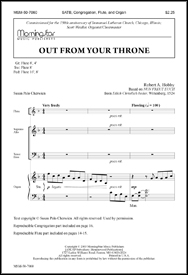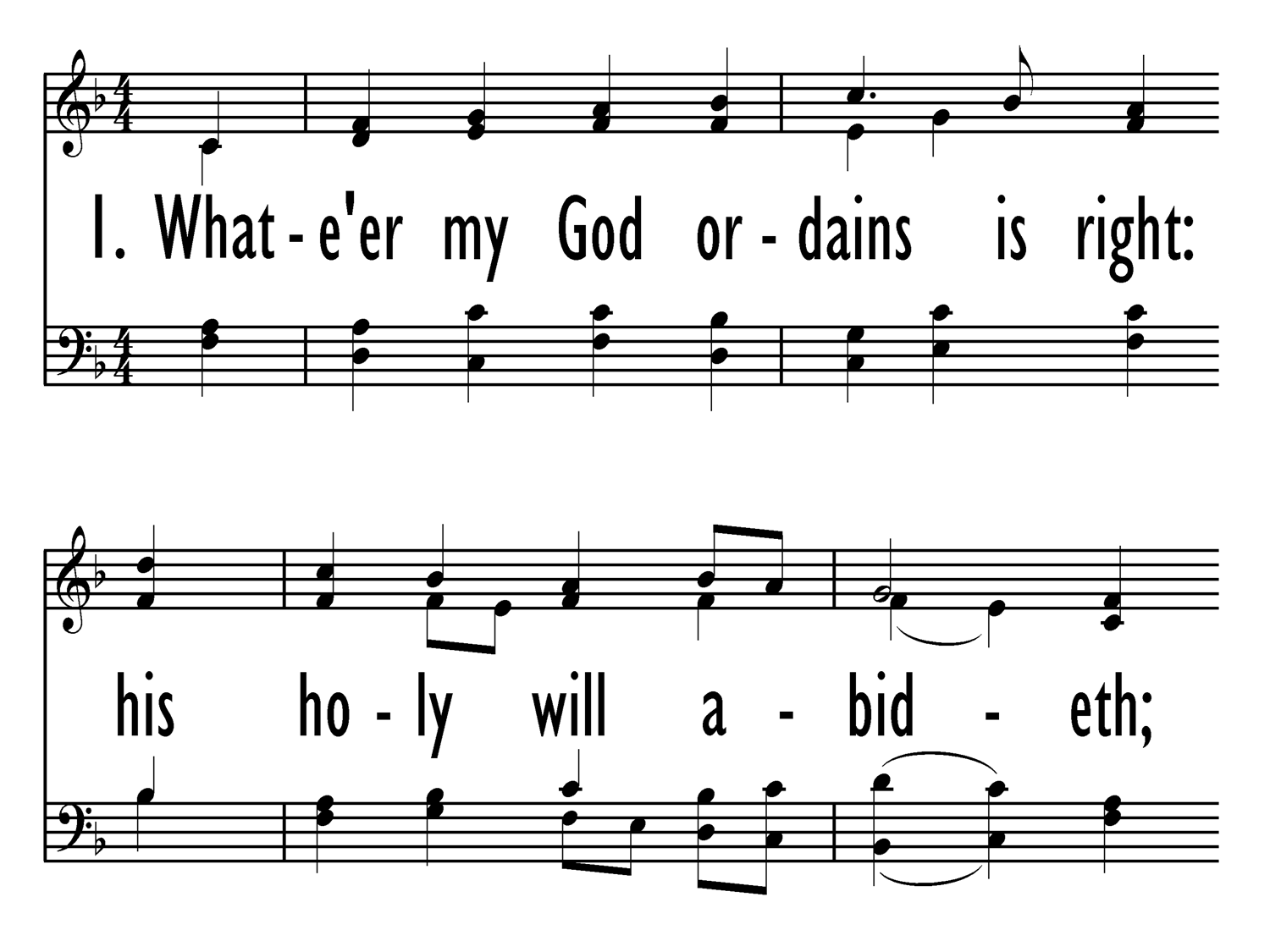- |
User Links
Whatever My God Ordains Is Right

Whatever my God ordains is right, Holy His will abideth
Translator: Catherine Winkworth; Author: Samuel Rodigast (1675)Tune: WAS GOTT TUT
Published in 74 hymnals
Printable scores: PDF, MusicXMLAudio files: MIDI
Representative Text
1 Whate'er my God ordains is right:
his holy will abideth;
I will be still, whate'er he doth,
and follow where he guideth.
He is my God; though dark my road,
he holds me that I shall not fall:
wherefore to him I leave it all.
2 Whate'er my God ordains is right:
he never will deceive me;
he leads me by the proper path;
I know he will not leave me.
I take, content, what he hath sent;
his hand can turn my griefs away,
and patiently I wait his day.
3 Whate'er my God ordains is right:
though now this cup, in drinking,
may bitter seem to my faint heart,
I take it, all unshrinking.
My God is true; each morn anew
sweet comfort yet shall fill my heart,
and pain and sorrow shall depart.
4 Whate'er my God ordains is right:
here shall my stand be taken;
though sorrow, need, or death be mine,
yet am I not forsaken.
My Father's care is round me there;
he holds me that I shall not fall:
and so to him I leave it all.
Source: Trinity Psalter Hymnal #231
Translator: Catherine Winkworth
 Catherine Winkworth (b. Holborn, London, England, 1827; d. Monnetier, Savoy, France, 1878) is well known for her English translations of German hymns; her translations were polished and yet remained close to the original. Educated initially by her mother, she lived with relatives in Dresden, Germany, in 1845, where she acquired her knowledge of German and interest in German hymnody. After residing near Manchester until 1862, she moved to Clifton, near Bristol. A pioneer in promoting women's rights, Winkworth put much of her energy into the encouragement of higher education for women. She translated a large number of German hymn texts from hymnals owned by a friend, Baron Bunsen. Though often altered, these translations continue to be used i… Go to person page >
Catherine Winkworth (b. Holborn, London, England, 1827; d. Monnetier, Savoy, France, 1878) is well known for her English translations of German hymns; her translations were polished and yet remained close to the original. Educated initially by her mother, she lived with relatives in Dresden, Germany, in 1845, where she acquired her knowledge of German and interest in German hymnody. After residing near Manchester until 1862, she moved to Clifton, near Bristol. A pioneer in promoting women's rights, Winkworth put much of her energy into the encouragement of higher education for women. She translated a large number of German hymn texts from hymnals owned by a friend, Baron Bunsen. Though often altered, these translations continue to be used i… Go to person page >Author: Samuel Rodigast
Samuel Rodigast, son of Johann Rodigast, pastor at Groben near Jena, was born at Groben Oct. 19, 1649. He entered the University of Jena in 1668 (M.A. 1671), and was in 1676 appointed adjunct of the philosophical faculty. In 1680 he became conrector of the Greyfriars Gymnasium at Berlin. While in this position he refused the offers of a professorship at Jena and the Rectorships of the Schools at Stade and Stralsund. Finally, in 1698, he became rector of the Greyfriars Gymnasium, and held this post till his death. His tombstone in the Koster-Kirche in Berlin says he died "die xxix. Mart. a. MDCCVII . . . aetatis anno lix." ...Two hymns have been ascribed to him, on of which has passed into English, viz.:--"Whatever God ordains is right.… Go to person page >Text Information
| First Line: | Whatever my God ordains is right, Holy His will abideth |
| Title: | Whatever My God Ordains Is Right |
| German Title: | Was Gott thut das ist wohlgetan |
| Author: | Samuel Rodigast (1675) |
| Translator: | Catherine Winkworth |
| Meter: | 8.6.8.6.4.4.8.8 |
| Language: | English |
| Copyright: | Public Domain |
Tune
WAS GOTT TUTWAS GOTT TUT is usually attributed to Severus Gastorius (b. Ottern, near Weimar, Germany, 1646; d. Jena, Germany, 1682), who presumably composed the tune during a convalescence in 1675 (see above). The tune was published in Ausserlesenes Weimarisches Gesangbuch (1681). Educated at the University of…


 My Starred Hymns
My Starred Hymns






